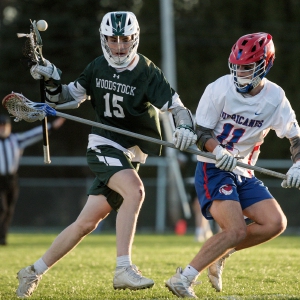Jim Kenyon: Dartmouth hands its football coach a win at home
| Published: 06-12-2021 9:54 PM |
In January 2005, then-Dartmouth Athletic Director Josie Harper announced that Buddy Teevens had agreed to return to his alma mater as football coach.
When asked, Harper wouldn’t go into the specifics of Teevens’ contract, such as how long it was for, his annual salary and other perks. “We’re not doing anything special,” Harper said in an interview with Valley News sports editor Don Mahler, who retired in 2015. “We’re not going to treat Buddy any differently (than other coaches).”
Oh, really?
Sixteen years into his tenure, Teevens is reaping the benefits of his original agreement, which, come to find out, was more special than Dartmouth let on.
In August 2005, the college helped Teevens and his wife, Kirsten, purchase a nearly $1 million home in downtown Hanover that the couple then moved into.
Dartmouth and the Teevenses remained 50-50 partners in the five-bedroom colonial at Currier Place until last December, when the Teevenses became the property’s sole owner.
In exchange for its 50% stake in the home, Dartmouth received a payment of $430,000, according to a Grafton County tax stamp, which is public record. That’s less than half — by about $65,000 — of the $993,530 that the house sold for in 2005 when Dartmouth and the Teevenses bought it together.
In April, the Teevenses put the house on the market for $1.4 million, or roughly $400,000 more than it sold for in 2005. Twelve days later, the house was under contract.
Article continues after...
Yesterday's Most Read Articles
 Upper Valley winter shelters kept dozens warm and dry
Upper Valley winter shelters kept dozens warm and dry
 Former principal of South Royalton School released from prison
Former principal of South Royalton School released from prison
 Owner of Friesian horse facility ordered to pay care costs for seized animals
Owner of Friesian horse facility ordered to pay care costs for seized animals
The deal isn’t yet finalized, so the name of the buyer and the purchase price aren’t public record. But in the current real estate market, I think it’s safe to assume the Teevenses got their asking price, if not more.
Why is any of this newsworthy?
Last July, Dartmouth announced it was immediately eliminating five varsity athletic programs — men’s lightweight crew, men’s and women’s golf and men’s and women’s swimming and diving — in part to reduce athletic department expenses.
The programs were reinstated in January, after members of the women’s golf and swimming teams threatened legal action. Their lawyer argued the cuts put Dartmouth out of compliance with Title IX, which prohibits federally funded schools from discriminating against students and employees based on sex.
Still, if Dartmouth was hurting so badly financially that it needed to ax five sports, why did it give up its share of a house within walking distance of campus at a bargain basement price?
I’m guessing it was Dartmouth’s way of handing its successful football coach a hefty bonus disguised as a real estate transaction.
It also makes me wonder if other coaches — female coaches, in particular — have received house deals. When I asked about what housing help, if any, that Dartmouth had given other coaches, spokeswoman Diana Lawrence told me the college wouldn’t comment on “employee matters or individual recruitment and retention activities.”
Last week, I made a few calls and searched online property tax records at the Grafton County Register of Deeds office. I didn’t find any current or former Dartmouth coaches who had an arrangement like Teevens’.
But I don’t think this story is as much about Teevens as it is about how Dartmouth conducts the business of sports. Like many wealthy private colleges, Dartmouth prefers to keep its dealings with coaches hush-hush.
And for good reason. It’s easier to get away with compensating women’s coaches less than their men’s team counterparts when contract details remain hidden.
As Frances Mize, a Dartmouth student, recently reported in the Valley News, head coaches of men’s sports at Dartmouth earned nearly $40,000 more on average than those of women’s sports last year. The 1994 Equity in Athletics Disclosure Act requires colleges to report the average salaries of coaches for all men’s and women’s teams combined, but they don’t have to break it down by sport.
Keeping a lid on salaries also helps Dartmouth and other Ivy League schools promote the notion that they’re keeping college athletics in the proper perspective. Especially when it comes to football.
But even in the Ivy League, football is king.
In 1965, following an undefeated season, Dartmouth football coach Bob Blackman was attracting interest from larger schools. To keep Blackman from leaving, the story goes, Dartmouth moved him and his family into a house on Lyme Road.
After another undefeated season in 1970, Blackman departed for the University of Illinois. The next two head coaches — Jake Crouthamel and Joe Yukica — also lived in the college-owned property before the arrangement ended in the 1980s. Two Dartmouth professors purchased the house from the college last year for $890,000, town records show.
When I heard Teevens was selling his place, I wondered if he was planning to retire soon. But when we talked by phone last week, Teevens, who turns 65 this upcoming season, told me that’s not the case. The decision to sell was a “downsizing” move, he said, adding that he and his wife will rent a downtown apartment from the college. They also own a home in Florida.
Teevens politely declined to talk about the circumstances that led Dartmouth to give up its 50% interest in his home. As strange as it sounds, I think Teevens deserves to be rewarded financially, or otherwise, for the job he’s done.
Along with coaching Dartmouth to a pair of Ivy League championships in the last five seasons, he’s led the effort to reduce concussions in football, introducing the use of robotic tackling dummies at practices. He’s proven that winning isn’t predicated on players banging heads every day. He’s also had two female coaches on his staff, both of whom now work for NFL teams.
But until Dartmouth and other private colleges become more open — along the lines of what’s required of state schools — about their business dealings, compensation inequities between men and women in the coaching ranks will continue to get short shrift.
How fair is that?
Jim Kenyon can be reached at jkenyon@vnews.com.

 Woodstock boys lax defense steps up, holds off Hartford
Woodstock boys lax defense steps up, holds off Hartford Pick a sport and Pete DePalo’s has probably officiated it over the past 40-plus years
Pick a sport and Pete DePalo’s has probably officiated it over the past 40-plus years Lebanon girls lacrosse prevails over Coe-Brown
Lebanon girls lacrosse prevails over Coe-Brown Local roundup: Lebanon softball sweeps wins from Souhegan, Stark
Local roundup: Lebanon softball sweeps wins from Souhegan, Stark
